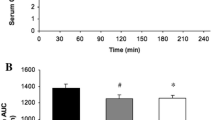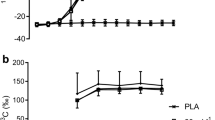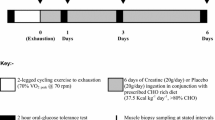Abstract
This study examined the effects of ingesting 500 ml/h of either a 10% carbohydrate (CHO) drink (CI) or placebo (PI) on splanchnic glucose appearance rate (endogenous + exogenous) (R a), plasma glucose oxidation and muscle glycogen utilisation in 17, non-carbohydrate-loaded, male, endurance-trained cyclists who rode for 180 min at 70% of maximum oxygen uptake. Mean muscle glycogen content at the start of exercise was 130±6 mmol/kg ww; (mean ± SEM). Total CHO oxidation was similar in CI and PI subjects and declined during the trial. R a increased significantly during the trial (P < 0.05) in both groups. Plasma glucose oxidation also increased significantly during the trial, reaching a plateau in the PI subjects, but was significantly (P < 0.05) higher in CI than PI subjects at the end of exercise [(98 ± 14 vs. 72 ± 10 μmol/min/kg fat-free mass) (FFM) (1.34 ± 0.19 vs. 0.93 ± 0.13 g/min)]. However, mean endogenous R a was significantly (P < 0.05) lower in the CI than PI subjects throughout exercise (35 ± 7 vs. 54 ± 6 μmol/min/kg FFM), as was the oxidation of endogenous plasma glucose, which remained almost constant in CI subjects, and reached values at the end of exercise of 42 ± 13 and 72 ± 10 μmol/min/kg FFM in the CI and PI groups respectively. Of the 150 g CHO ingested during the trial, 50% was oxidised. Muscle glycogen disappearance was identical during the first 2 h of exercise in both groups and continued at the same rate in PI subjects, however no net muscle glycogen disappearance occurred during the final hour in CI subjects. We conclude that ingestion of 500 ml/h of a 10% CHO solution during prolonged exercise in non carbohydrate loaded subjects has a marked liver glycogen-sparing effect or causes a reduction in gluconeogenesis, or both, maintains plasma glucose concentration and has a muscle glycogen-sparing effect.
Similar content being viewed by others
References
Ahlborg G, Felig P (1976) Influence of glucose ingestion on fuel-hormone response during prolonged exercise. 41: 683–688
Bergstrom J, Hultman E (1967) A study of the glycogen metabolism during exercise in man. Scand J Clin Lab Invest 19: 218–228
Bjorkman O, Sahlin K, Hagenfeldt L, Wahren J (1984) Influence of glucose and fructose ingestion on the capacity for long-term exercise in well-trained men. Clin Physiol 4: 483–494
Bonen A, McDermott JC, Hutber CA (1989) Carbohydrate metabolism in skeletal muscle: an update of current concepts. Int J Sports Med 10: 385–401
Bosch AN, Dennis SC, Noakes TD (1993) Influence of carbohydrate loading on fuel substrate turnover and oxidation during prolonged exercise. J Appl Physiol 74: 1921–1927
Bosch AN, Dennis SC, Noakes TD (1994) Influence of carbohydrate ingestion on fuel substrate turnover and oxidation during prolonged exercise. J Appl Physiol 76: 2364–2372
Coggan AR, Coyle EF (1987) Reversal of fatigue during prolonged exercise by carbohydrate infusion or ingestion. J Appl Physiol 63: 2388–2395
Coggan AR, Spina RJ, Kohrt WM, Bier DM, Holloszy JO (1991) Plasma glucose kinetics in a well-trained cyclist fed glucose throughout exercise. Int J Sport Nutr 1: 279–288
Consolazio CR, Johnson RE, Pecora LT (1963) Physiological measurements of metabolic functions in man. McGraw-Hill, New York, pp 72–87
Coyle EF, Hagberg JM, Hurley BF, Martin WH, Ehsani AA, Holloszy JO (1983) Carbohydrate feeding during prolonged strenuous exercise can delay fatigue. J Appl Physiol 55: 230–235
Coyle EF, Coggan AR, Hemmert MK, Ivy JL (1986) Muscle glycogen utilization during prolonged strenuous exercise when fed carbohydrate. J Appl Physiol 61: 165–172
DeFronzo RA, Ferrannini E, Sato Y, Felig P, Wahren J (1981) Synergistic interaction between exercise and insulin on peripheral glucose uptake. J Clin Invest 68: 1468–1474
Durnin JV, Womersley J (1974) Body fat assessed from total body density and its estimation from skinfold thickness: measurements on 481 men and women aged from 16 to 72 years. Br J Nutr 32: 77–97
Frayn KN (1983) Calculation of substrate oxidation rates in vivo from gaseous exchange. J Appl Physiol 55: 628–634
Gollnick PD, Pernow B, Essen B, Jansson E, Saltin B (1981) Availability of glycogen and plasma FFA for substrate utilization in leg muscle of man during exercise. Clin Physiol 1: 27–42
Hargreaves M, Costill DL, Coggan A, Fink WJ, Nishibata I (1984) Effect of carbohydrate feedings on muscle glycogen utilization and exercise performance. Med Sci Sports Exerc 16: 219–222
Hargreaves M, Kiens B, Richter EA (1991) Effect of increased plasma free fatty acid concentrations on muscle metabolism in exercising men. J Appl Physiol 70: 194–201
Jenkins AB, Furler SM, Chisholm DJ, Kraegen EW (1986) Regulation of hepatic glucose output during exercise by circulating glucose and insulin in humans. Am J Physiol 250: R411-R417
Karlsson J, Saltin B (1971) Diet, muscle glycogen, and endurance performance. J Appl Physiol 31: 203–206
Katz A, Broberg S, Sahlin K, Wahren J (1986) Leg glucose uptake during maximal dynamic exercise in humans. Am J Physiol 251: E65-E70
Kuipers H, Keizer HA, Brouns F, Saris WH (1987) Carbohydrate feeding and glycogen synthesis during exercise in man. Pflügers Arch 410: 652–656
Levine L, Evans WJ, Cadarette BS, Fisher EC, Bullen BA (1983) Fructose and glucose ingestion and muscle glycogen use during submaximal exercise. J Appl Physiol 55: 1767–1771
Massicotte D, Peronnet F, Allah C, Hillaire-Marcel C, Ledoux M, Brisson G (1986) Metabolic response to 13C glucose and 13C fructose ingestion during exercise. J Appl Physiol 61: 1180–1184
Radziuk J, Norwich KH, Vranic M (1978) Experimental validation of measurements of glucose turnover in nonsteady state. Am J Physiol 234: E84-E93
Rehrer NJ, Wagenmakers AJ, Beckers EJ, Halliday D, Leiper JB, Brouns F, Maughan RJ, Westerterp K, Saris WH (1992) Gastric emptying, absorption, and carbohydrate oxidation during prolonged exercise. J Appl Physiol 72: 468–475
Rennie MJ, Holloszy JO (1977) Inhibition of glucose uptake and glycogenolysis by availability of oleate in well-oxygenated perfused skeletal muscle. Biochem J 168: 161–170
Richter EA, Sonne B, Mikines KJ, Ploug T, Galbo H (1984) Muscle and liver glycogen, protein, and triglyceride in the rat. Effect of exercise and of the sympatho-adrenal system. Eur J Appl Physiol 52: 346–350
Steele R (1959) Influcence of glucose loading and of injected insulin on hepatic glucose output. Ann NY Acad Sci 82: 420–430
Wahren J, Felig P, Ahlborg G, Jorfeldt L (1971) Glucose metabolism during leg exercise in man. J Clin Invest 50: 2715–2725
Wolfe RR, Nadel ER, Shaw JH, Stephenson LA, Wolfe MH (1986) Role of changes in insulin and glucagon in glucose homeostasis in exercise. J Clin Invest 77: 900–907
Yaspelkis BB, Patterson JG, Anderla PA, Ding Z, Ivy JL (1993) Carbohydrate supplementation spares muscle glycogen during variable-intensity exercise J Appl Physiol 75: 1477–1485
Author information
Authors and Affiliations
Rights and permissions
About this article
Cite this article
Bosch, A.N., Weltan, S.M., Dennis, S.C. et al. Fuel substrate turnover and oxidation and glycogen sparing with carbohydrate ingestion in non-carbohydrate-loaded cyclists. Pflügers Arch — Eur J Physiol 432, 1003–1010 (1996). https://doi.org/10.1007/s004240050228
Received:
Revised:
Accepted:
Published:
Issue Date:
DOI: https://doi.org/10.1007/s004240050228




